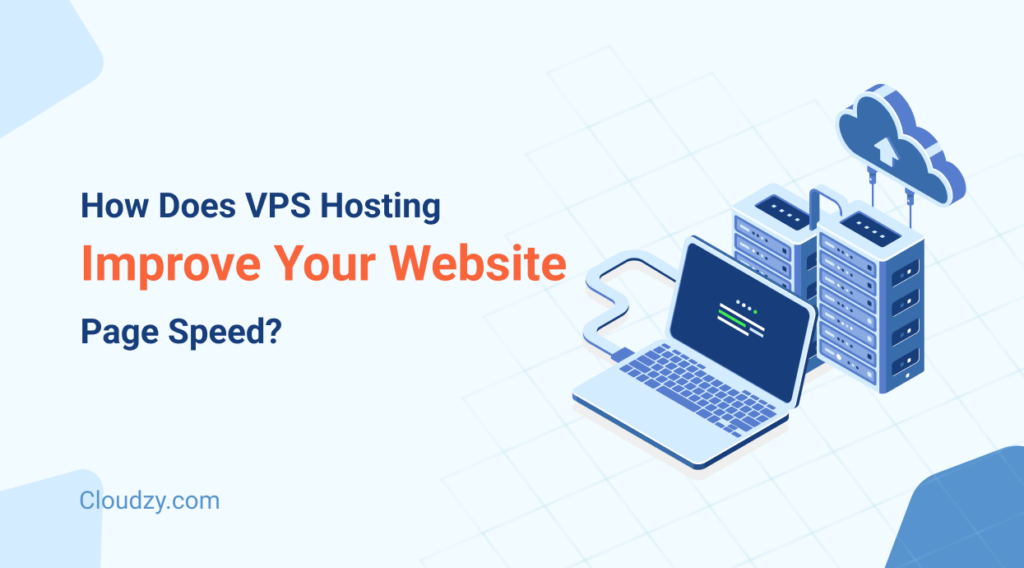For businesses in the active growth stage, there comes a time when their website’s performance hits a barrier. Neither their private server nor the shared hosting they’ve tried can cope with the increased load. More users, higher traffic, more strain on server resources, and the page loading speed can no longer meet the new demands.
What can you do if you find yourself in the same situation? Dedicated hosting is expensive and perhaps even overkill, given the power and server configuration complexity.
VPS or Virtual Private Server hosting appears to be the way to go. Without the excessive increase in maintenance complexity and running costs, it can ensure the required boost to page speed.
Think a VPS server might be a solution for you — but not sure? Let’s walk through the facts.
SEO and Business Impact
First, let’s talk about benefits. Before making such a big decision to transition your website hosting from your current server to a new one, you’d better be absolutely sure about your move.
The good news is — the benefits are totally worth it. They extend beyond page loading speed and encompass SEO performance, search rankings, and better conversion rates through superior user experience.
Improved SEO Rankings Through Faster Loading
Faster loading speeds are critically important to users. As attention span is getting shorter and shorter (some say it’s only 3 seconds nowadays), nobody is willing to wait for a page to load. Anything longer than a blink of an eye causes frustration. That’s the new reality.
Search engines like Google “know” this. In other words, their algorithms are configured to favor websites with fast page loading speeds. Google would rank sites utilizing VPS hosting higher for their ability to speed up page loading time. This has a positive impact on a critical performance metric called SEO ranking.
⚡ Pro Tip: VPS server speeds things up — but want even better SEO results? Receive some links from authoritative sites to build trust and rank fast.
Better Conversion Rates from Enhanced User Experience
Following this logical chain of causes and effects, the next thing that happens to high-ranking websites is that they get much higher incoming traffic. These visitors are guaranteed a better user experience (UX) since pages on your website load faster now that you’ve started using VPS.
The final destination is the Holy Grail of marketing in general and SEO in particular — better conversion rates. Users with satisfactory experience on your site will be more likely to perform the desired action, i.e., to convert (make a click on your ad, download an app, view a video, subscribe, or make a purchase).
Need any more reasons to give VPS a shot?
VPS Hosting Technical Advantages
A slight technical detour into the mechanism behind VPS and faster page speed won’t hurt. Knowing its advantages will let you weigh all the pros and cons against shared or dedicated hosting, and VPS falls right in between these two extremes.
Dedicated Server Resources
Dedicated server resources, in the case of VPS hosting, means that you are guaranteed a certain capacity (usually measured in percentage) of the available server CPU, bandwidth, and RAM.
Compared to the shared server, it’s a big advantage since you don’t need to compete for the available resources. At all times, you know that the server can handle a fixed traffic load, and that’s a big plus to your confidence with page loading speed.
At the same time, VPS doesn’t give all of its resources to you only — other members also enjoy their dedicated processing power.
So, what are the advantages of VPS hosting?
- Consistent performance even during peak traffic hours
- Faster request handling thanks to dedicated CPU and RAM
- No resource competition with other websites
- More control over how your allocated resources are used
- Reduced latency for faster page loading speed
All of these advantages translate into faster page loading speeds, directly affecting user experience, satisfaction, conversions, and search ranking.
⚡ Pro Tip: Use compression methods (like Gzip or Brotli) to reduce bandwidth usage and speed up content delivery.
Custom Server Optimization
In addition to the enhanced performance on VPS, this server type also gives users more freedom to configure their virtual server parameters. Essentially, you have full control over the dedicated virtual server environment and are not limited by the default configuration parameters like with the shared hosting.
The access to server configuration is granted to you through root access to administrative control. Here are the examples of the things you can do with a customer server optimization:
- Modify PHP limits for better performance, adjusting how much memory scripts can use and how long they run.
- Configure lightweight, fast web servers using tools like NGINX or LiteSpeed for better page speed and flexibility.
- Enhance response times by enabling server-level caching with Varnish, OPCache, or Redis.
- Build your ideal environment by installing the OS and management panel that match your needs.
Designed for flexibility and convenience, VPS adapts to your goals instead of forcing you to adapt to its rules. In short — VPS hosting puts you in full control over server configuration.
⚡ Pro Tip: Cut down on non-essential server tasks to free up resources for high-priority applications, such as WordPress.
Better Caching Capabilities
Those of us who remember the time when early Windows versions required manual configuration due to the limited PC resources must understand what caching is. Do you?
But as a quick reminder — it’s the option to store frequently accessed applications and elements (textual or graphical) in a temporary memory. This significantly reduced loading times as there is no need to retrieve content from databases and libraries on hard drives where it is permanently stored.
For website performance, caching is a vital element. Much of the page and web server speed depends upon caching. If it’s available and fast, frequently accessed pages load like a charm.
A VPS gives you control over several advanced caching options:
- Customizable cache settings for different types of content (e.g., dynamic vs. static).
- The freedom to choose various caching strategies for your website needs using tools like Varnish, Redis, Memcached, and OPCache.
- Optimized content speed for large, resource-intensive websites (e.g., news and media sites, e-commerce sites, social media, and streaming platforms).
These options enable you to configure your website cache according to your marketing goals. The result is a seamless user experience, leading to faster page loading times and improved SEO performance overall.
⚡ Pro Tip: Fine-tune TTL (Time to Live) values for different content types based on their update frequency to prevent overloading your server.
Website Isolation from Neighboring Sites
One of the main perks you get from VPS server is that your website becomes virtually isolated from other sites. This is a unique feature of this type of hosting, as VPS stipulates owning a virtual environment on a physical server.
Think of VPS as a physical machine that gets split into multiple virtual environments. One of them is yours.
Your dedicated environment can be run on the server’s default OS, or alternatively, you can install your own OS and other supporting software. This allows each environment to function independently of one another.
Your neighbors cannot interfere with your website’s operations, nor can they claim the resources (CPU, RAM, or bandwidth) virtually allocated to you. This guarantees your website improved uptime and superior stability.
⚡ Pro Tip: Periodically test the isolation of your environment by running stress tests or traffic spikes.
Server Management & Tools
Those who want to get the maximum return from VPS hosting in terms of page speed should look beyond standard virtual private server capabilities. In particular, the attention should be on the additional server management tools.
Better Control Over Content Delivery Networks
Content Delivery Network (CDN) allows marketers to optimize static content distribution and access. Whenever a customer accesses your website, CDN is there to pull out cached content from the nearest server location.
In the case of VPS, you get full control over how many and which types of CDNs you use. In addition to website speed improvement, this also gives a range of other benefits:
- Reduce the load on your virtual server.
- Enhance user experience with consistent performance worldwide (if a user is traveling, they will get seamless connectivity and consistent speeds from whatever location).
- Protect your site from attacks using HTTPS and advanced DDoS filtering.
- Improve your website’s search rankings.
Don’t forget the role of personalized content in increasing user interaction and loyalty. CDNs, in combination with AI-powered content-generation tools like ChatGPT and Claude, allow for hyper-personalized content delivered to individual customers practically in real time.
Modern content marketers cannot imagine their work without a CDN. It gives them many advantages, including increased customer engagement and improved conversions through better website stability.
Access to Performance Monitoring Tools
To push the pedal to the metal and get a maximum speed and performance output takes more than brutal force. It requires one to look under the hood with the help of performance monitoring tools.
Maximum web server speed comes with performance efficiency improvements. In VPS, you get full access to monitoring tools and dashboards, so you can dig into the data that matters. Such tools as Zabbix, Netdata, Nagios, and New Relic were designed to help sysadmins and developers finetune their virtual server configuration for the following benefits:
- Monitor CPU load, memory use, disk activity, and bandwidth in real time.
- Spot unusual traffic increases that could demand scaling adjustments.
- Log and error tracking to identify issues that stay in the way of page load speed.
- Use automated reporting and alerts to track server health.
Even during peak load periods and sudden spikes in server resource consumption, these tools will ensure your server stays up and running, delivering lightning-fast page speeds.
The Bottom Line
VPS is a budget-friendly hosting type for those who want to use most of the advantages of dedicated hosting but are not ready to pay the full price. Even in its standard (default) functionality, VPS hosting provides a significant boost to page speed, allowing handling peak traffic and resource consumption with ease.
However, for the maximum bang for your money, consider learning and leveraging additional server management tools like CDN and performance monitoring.



